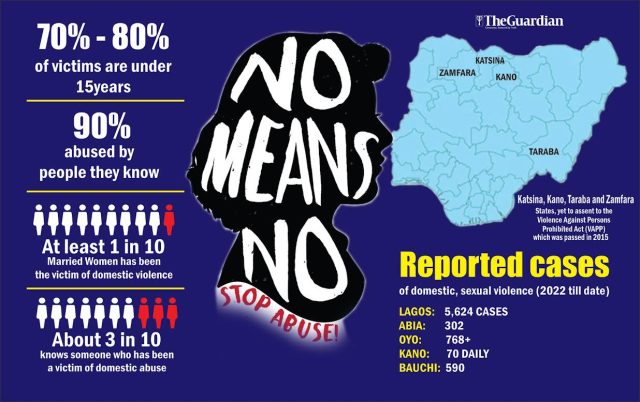Despite the enactment of the Violence Against Persons Prohibition (VAPP) Act in 2015, cases of domestic and sexual violence have continued to rise across states in Nigeria, revealing a deeply concerning and pervasive issue that demands substantial attention and a comprehensive approach to address.
The VAPP Act was introduced with the primary aim of eliminating violence in both private and public life. It sought to provide maximum protection to victims, deliver effective remedies, and impose significant penalties on offenders. This legislation was expected to serve as a robust legal framework to combat violence against persons in all its forms, particularly focusing on domestic and sexual violence.
However, despite the noble intentions behind the VAPP Act, its implementation has not resulted in a significant reduction in cases of sexual and gender-based violence in many parts of Nigeria. It is a stark reminder that changing deeply entrenched cultural norms and societal attitudes is a complex and long-term process that requires concerted efforts from various stakeholders.
A recent case in Lagos, where a medical director was sentenced to life imprisonment for sexually abusing a minor, exemplifies the gravity of the problem. Justice Rahman Oshodi, who presided over the case, harshly criticized the offender and underscored the need for stricter penalties to deter potential abusers. This case serves as a sobering reminder of the trauma and long-term consequences that victims of sexual violence endure.
Furthermore, some judges, like Justice Eberechi Wike in Rivers State, have taken a bold stance in advocating for more severe punishments, even going as far as suggesting amputation for sexual offenders. While such suggestions may be considered extreme, they reflect the frustration and urgency felt by those who are deeply concerned about the continued prevalence of sexual violence.
The data paints a troubling picture, showing an alarming increase in cases of sexual and gender-based violence across the country. Even more distressing is the fact that many cases remain unreported. This underreporting is often attributed to various factors, including stigma, lack of awareness about available support services, and the deeply entrenched patriarchal norms that can silence survivors.
States like Lagos, Oyo, and Nasarawa have taken commendable steps to address the issue. They have created specialized agencies and enacted laws aimed at addressing and preventing sexual and gender-based violence. While these efforts are essential, significant challenges remain.
One such challenge is the absence of family courts that can provide vital support to children who are victims of abuse. These courts play a critical role in ensuring that children receive the necessary protection and assistance in navigating the complex legal system. Without such dedicated family courts, child victims may face additional obstacles in seeking justice and support.
Efforts to combat gender-based violence must be multifaceted. Standardized data collection is essential to gain a comprehensive understanding of the scope of the problem. This data can inform policy decisions, resource allocation, and targeted interventions.
Increasing public awareness about the prevalence of sexual and gender-based violence is another crucial aspect of addressing this issue. Public awareness campaigns can help reduce stigma, encourage reporting, and promote a culture of accountability.
Parents and guardians play a pivotal role in child protection. They must be educated on recognizing signs of abuse, profiling potential abusers, and understanding the steps to take in reporting such incidents. Empowering parents and caregivers with the knowledge and tools to protect children is an integral part of the prevention strategy.
Stricter enforcement of existing laws is indispensable. Collaboration among various stakeholders, including law enforcement, medical personnel, the justice sector, non-governmental organizations, and community leaders, is essential to comprehensively address this pervasive problem. These stakeholders must work in synergy to ensure that abusers are held accountable, survivors receive support, and society as a whole is actively engaged in ending gender-based violence.
Conclusion: domestic violence

The issue of sexual and gender-based violence in Nigeria is a deeply ingrained and complex problem that requires a comprehensive, multi-pronged approach. While legislative measures like the VAPP Act are crucial, their effectiveness relies on robust implementation, public awareness, and a united effort from all sectors of society. Only through such concerted action can Nigeria hope to stem the tide of this deeply troubling issue and ensure the safety and well-being of its citizens.










